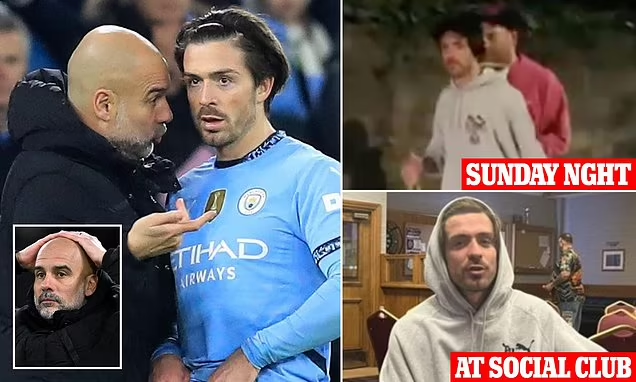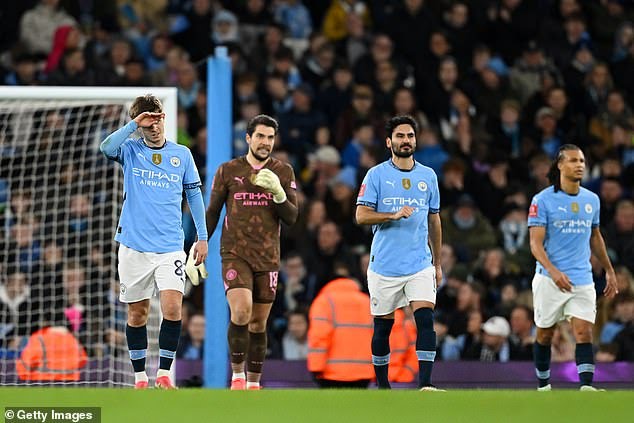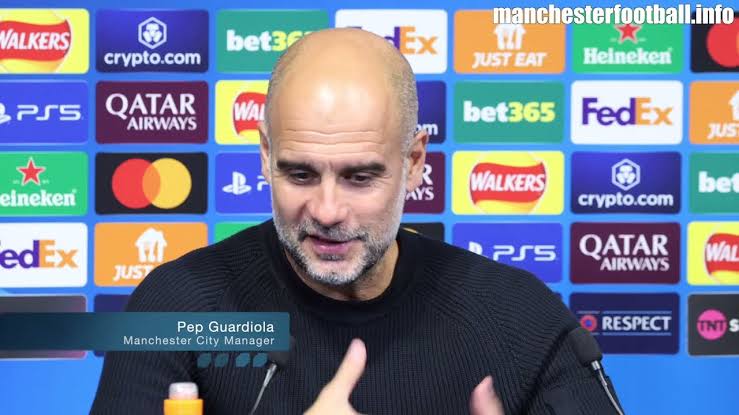Pep Guardiola breaks silence on Jack Grealish as Man City boss makes telling admission following England

Jack Grealish’s Sunday evening expedition began innocuously enough as a day off following Manchester City’s FA Cup victory over Plymouth. What started as a visit to a local pub in Gorton, situated just two miles from the Etihad Stadium, evolved into a more extensive journey that would ultimately generate significant media attention and public discussion about professional conduct.
The 29-year-old England international’s travels took him northward to Wearside and eventually Newcastle, where his presence at various establishments quickly became public knowledge. Social media images and videos captured Grealish in jovial spirits, generously putting hundreds of pounds behind bars to cover drinks for fellow patrons – a gesture that demonstrated both his generosity and perhaps his desire to connect with regular football supporters away from the pressures of elite-level competition.
The sequence of events highlighted the modern footballer’s challenge in maintaining privacy while living under constant public scrutiny. Grealish’s activities, while perfectly legal and occurring during his allocated time off, became subject to widespread discussion and analysis, raising questions about the expectations placed on professional athletes regarding their personal conduct.
For Grealish, the weekend represented a brief escape from the pressures that have mounted throughout a challenging season. His limited playing time and peripheral role in Guardiola’s tactical plans have created frustration that may have contributed to his desire to unwind in a more relaxed environment, connecting with supporters who continue to appreciate his presence despite his reduced on-field prominence.
Guardiola’s Philosophy on Player Management
Pep Guardiola’s response to questions about Grealish’s weekend activities revealed his mature approach to managing elite athletes in the modern era. The Catalan coach’s acknowledgment that he cannot and should not control players’ private lives demonstrates an understanding of the boundaries between professional oversight and personal autonomy that has evolved throughout his managerial career.
“They know what they have to do,” Guardiola stated, establishing a framework of mutual respect and personal responsibility that underpins his relationship with squad members. This philosophy reflects his belief that adult professionals should be trusted to make appropriate decisions about their personal lives while understanding the potential consequences of their choices on their professional standing.
The manager’s emphasis on judging players solely based on their training performances and match contributions illustrates a pragmatic approach that prioritizes on-field excellence over off-field conduct, provided it remains within reasonable boundaries. This perspective allows Guardiola to maintain focus on tactical and technical development while avoiding the potential complications that arise from excessive interference in players’ personal affairs.
Guardiola’s handling of the situation also demonstrates his understanding of the media landscape that surrounds modern football. Rather than criticizing Grealish publicly or dismissing the significance of the incident, he acknowledged the reality while maintaining his professional standards and expectations for all squad members.
The Context of Grealish’s Struggles
Understanding Grealish’s weekend activities requires examining the broader context of his challenging season at Manchester City. The former Aston Villa captain has endured a frustrating period characterized by limited playing time, with his last Premier League start occurring over two months prior to the Newcastle incident. His status as an unused substitute in five of seven available matches reflects his declining influence in Guardiola’s tactical considerations.
Guardiola’s admission that Grealish has struggled to find his rhythm due to injury setbacks and irregular playing time provides insight into the cyclical nature of the player’s difficulties. The lack of consistent match opportunities has prevented Grealish from building the momentum necessary to compete effectively for starting positions, creating a challenging situation for both player and manager.
The psychological impact of reduced playing time on elite athletes cannot be understated. Grealish, who arrived at Manchester City as one of English football’s most expensive signings, has experienced the transition from guaranteed starter to squad player – a shift that inevitably affects confidence and motivation levels. His weekend activities might be viewed through this lens as a natural human response to professional frustration.
The timing of Grealish’s pub visits, occurring during a period when he has been marginalized within Guardiola’s plans, suggests a player seeking alternative outlets for the competitive energy and social interaction that regular football provides. His generous gestures toward fellow patrons may reflect a desire to maintain connection with the football community that has been his primary identity throughout his career.
The Broader Implications for Professional Football
The Grealish incident highlights broader questions about the expectations placed on modern footballers regarding their personal conduct and public image. The intense media scrutiny that follows top-level players creates an environment where virtually every action becomes subject to analysis and judgment, often without consideration for the human elements involved.
Social media’s role in amplifying such incidents has fundamentally changed the landscape of football celebrity. Players can no longer expect privacy even during their personal time, as smartphones and social platforms ensure that public appearances quickly become widespread news. This reality creates additional pressure on athletes who must navigate public life while dealing with professional challenges.
The financial investments made by clubs in their players naturally generate expectations about conduct and professionalism, but the boundaries of reasonable oversight remain contentious. Grealish’s situation demonstrates the ongoing tension between protecting valuable assets and respecting individual autonomy – a balance that varies significantly across different football cultures and organizational philosophies.
The incident also raises questions about the support systems available to players dealing with reduced roles or career transitions. Elite athletes often struggle with identity and purpose when their professional status changes, and the availability of appropriate counseling or mentorship becomes crucial in helping them navigate these challenges constructively.
Tactical and Strategic Considerations
From a purely football perspective, Grealish’s situation reflects the broader challenges facing Guardiola in managing a large squad filled with international-caliber players. The depth of Manchester City’s roster inevitably means that talented individuals will experience periods of reduced involvement, creating management challenges that extend beyond tactical considerations.
Guardiola’s tactical evolution has seen certain player profiles become less central to his preferred systems, and Grealish’s skill set may not align perfectly with the manager’s current strategic priorities. The Spaniard’s admission about wanting Grealish “at his best” suggests recognition of the player’s quality while acknowledging the practical difficulties in accommodating all talented squad members consistently.
The manager’s emphasis on training performance and match readiness reflects his meritocratic approach to team selection. Grealish’s challenge lies in demonstrating the consistency and tactical understanding necessary to force his way back into regular consideration, regardless of external distractions or personal frustrations.
Manchester City’s success in recent seasons has been built on squad rotation and tactical flexibility, but this approach inevitably creates winners and losers in terms of playing time. Grealish’s situation exemplifies the personal costs of collective success, where individual ambitions must sometimes be subordinated to team objectives.
The Path Forward for Player and Club
The resolution of Grealish’s situation will likely depend on his ability to refocus on football matters while managing the external pressures that have contributed to his current predicament. His weekend activities, while generating headlines, represent just one element in a more complex professional challenge that requires sustained effort and commitment to overcome.
Guardiola’s measured response suggests that Grealish retains the manager’s support, provided he can demonstrate the necessary application and performance levels in training and match situations. The door remains open for the player to rebuild his standing within the squad hierarchy through consistent professional conduct and improved on-field contributions.
The incident may ultimately serve as a catalyst for broader discussions about player welfare and support systems within elite football. Manchester City’s handling of the situation could influence how other clubs approach similar challenges, potentially leading to more comprehensive programs designed to help players navigate difficult periods in their careers.
For Grealish personally, the challenge lies in channeling his frustration constructively while maintaining the professional standards expected at Manchester City. His future at the club may depend on his ability to demonstrate renewed focus and commitment, using this incident as motivation rather than allowing it to become a distraction from his football development.
Conclusion: Lessons in Modern Football Management
The Grealish incident and Guardiola’s response illuminate the complexities of managing elite athletes in the contemporary football environment. The manager’s balanced approach – acknowledging personal autonomy while maintaining professional expectations – offers a template for handling similar situations that inevitably arise in modern football.
The episode underscores the importance of clear communication and mutual understanding between managers and players regarding expectations and boundaries. Guardiola’s emphasis on performance over personal conduct provides clarity for all squad members while maintaining the focus on football excellence that has defined Manchester City’s recent success.
Ultimately, the situation represents a learning opportunity for all parties involved. Grealish can use the experience to refine his approach to managing professional disappointment, while Manchester City can evaluate their support systems for players experiencing reduced roles. The resolution of this incident will likely influence both Grealish’s immediate future and the club’s broader approach to player management in challenging circumstances.
The football community’s reaction to the incident also reflects evolving attitudes toward player behavior and the balance between public scrutiny and personal freedom. As social media continues to reshape the relationship between athletes and supporters, incidents like this will continue to test the boundaries of acceptable conduct and reasonable expectations in professional sport.















